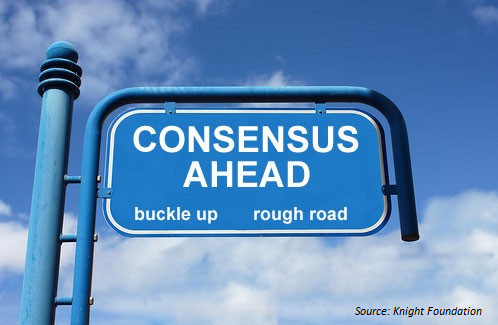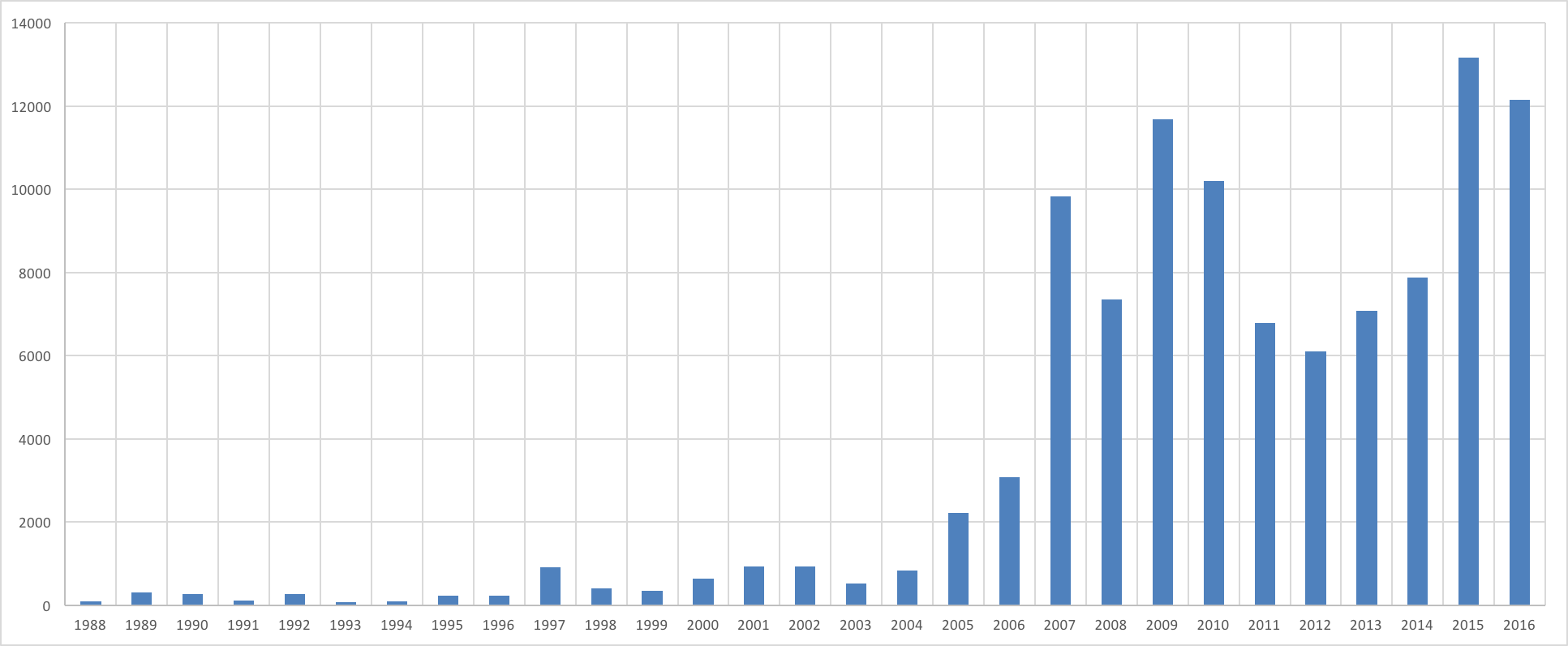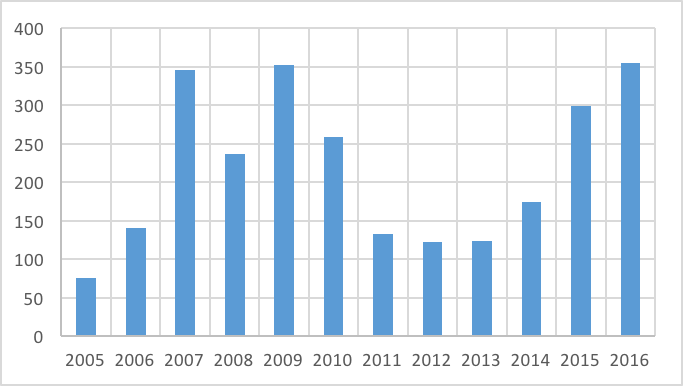
August 11, 2017, by Brigitte Nerlich
Tracing the contours of the consensus debate in climate change: The sequel
In August 2013 I wrote a blog post on the issue of ‘consensus’ in the context of climate change. This topic had been put into the climate communication spotlight by a paper published in May 2013 by Cook et al. entitled: ”Quantifying the consensus on anthropogenic global warming in the scientific literature” (for more background, see here). The abstract of the paper said: “Among abstracts expressing a position on AGW, 97.1% endorsed the consensus position that humans are causing global warming.” The paper was written to counter narratives “presented by some dissenters […] that the scientific consensus is ‘…on the point of collapse’ (Oddie 2012) (Allègre et al. 2012).” It caused a lot of controversy, regarding its methodology, its meaning and its message.
Updating some graphs
In this post I will not delve into the disputes surrounding the Cook et al. paper and its uses for what came to be known as ‘consensus messaging’ (or “the idea of informing people that there’s a scientific consensus on the subject” of anthropogenic climate change). Instead, I want to refresh my August 2013 blog post with some new data, in order to see what has happened to the ‘contours’ of the consensus debate over the last four years.
Consensus
The old post included a graph which provided an overview of English news that had used the words ‘consensus’ together with either ‘climate change’ or ‘global warming’ between 1988 and 2012 (using Lexis Nexis; duplicates have not been removed). I have now updated that graph to 2016.
As I said in 2013, although the word ‘consensus’ was probably used in a wide range of contexts and meanings, a few interesting bumps show up which seem to show that the graph follows the contours of the climate change debate as we know it. 1997 – Kyoto protocol, 2007 – fourth IPCC report, 2009 – Copenhagen summit and climategate; 2013/14 – fifth IPCC report; 2015 – Paris agreement, 2016 American presidential elections.
As one can see, the use of ‘consensus’ in the context of climate change/warming fell after climategate but has now gone up again after 2013. Is this linked to ‘consensus messaging’ I asked myself? Probably not, as in 2013 only 11 articles referred to the 97% consensus claim; in 2014 there were a few more, namely 19 (but five were duplicates); and a few more in 2015 – 31 with 4 duplicates; and for 2016 we have 17 papers with 2 duplicates. So not a lot. (Of course this doesn’t take into account online (etc.) uses of this claim)
The 2015 upturn is probably related to the Paris climate summit. This summit was billed as trying to reach a ‘consensus’ (an agreement) among nations about what to do about climate change. This type of ‘consensus’ is quite different to the 97% consensus which refers to the fact that thousands of scientists ‘agree’ that climate change is human-caused. We are, of course, dealing with two meanings of the words ‘agree‘ or ‘agreement’ (on the meanings of ‘consensus’ see here). In the 97% case ‘agree’ means ‘have the same opinion about something’; in the Paris case it means ‘say that one will do something which has been suggested by another person’.
No consensus
I’ll look more closely at the 31[27] articles published in 2015 below. But let us first update another graph that I included in my old blog post, the one depicting how English news used the phrase ‘no consensus’ in the context of climate change and/or global warming. In the old post, I had only searched for ‘no consensus’ and ‘climate change’. So, for this post, I did that graph again to include ‘global warming’.
The ‘contour’ remains the same (with peaks around the 2007 IPCC report, climategate and, now, the Paris agreement). There is an interesting upturn around 2016, probably linked to the US presidential election campaign.
Consensus/no consensus
In addition to updating these old graphs, I also want to add a new one, namely a Google Trend graph comparing searches for ‘climate hoax’ and ‘climate consensus’ (I searched Google trends on 4 August, 2017).
As one can see, searches for climate consensus (or similar phrases, such as ‘climate change consensus’, ‘consensus on climate change’, ‘scientific consensus on climate change’) were low (between 2004 and 2017), while there were quite big spikes in searches for ‘climate hoax’ or similar phrases (‘climate change hoax’, ‘global climate hoax’, ‘climate warming hoax’) around the time of climategate and around the time of the American election.
97% consensus articles in 2015
I now want to return to the small number of articles that referred to the 97% consensus claim in 2015. Of the 27 articles mentioning the 97% consensus, two were very long transcripts of testimonials by two climate critics, Roger Bezdek and Richard Lindzen (40854 words and 19856 words respectively), which I shall leave out here, as they deserve a separate analysis and are not news articles as such. Of the remaining 25 articles, a further three were duplicates. That leaves 22. Of these 14 supported the consensus study/message (seven by Dana Nuccitelli, two by John Cook, one by Chris Mooney), the rest contested it (of these four were related to press releases from the Heartland Institute, two were by Ross McKitrick).
The articles contesting the 97% consensus claim framed those supporting it as ‘alarmists’, while those contesting it called themselves climate ‘realists’. The 97% consensus claim was framed as ‘bogus’ and ‘biased’, ‘nonsense’ and ‘myth’. There was a lot of confusion about what the ‘consensus’ refers to and what the numbers are, especially amongst Republican presidential candidates. And finally, quite a few articles contesting the 97% consensus claim also talked about the so-called ‘pause’ or ‘slowdown in global warming’.
Interestingly, the first article in the sample was a letter to the editor of the Nottingham Post, written by Roger Helmer, UKIP MEP for the East Midlands. In an exchange with Joanna Haigh, a climate scientist at Imperial College, he said that “she might like to note that we are dealing here with climate science, and despite the nonsense claim of a ‘97% consensus’, the fact is that there are wide divergences of view amongst scientists”….. thus nicely opening up and entrenching the so-called ‘consensus gap’ that so-called ‘consensus messaging’ tries to close… ad infinitum…
Image: Flickr
No comments yet, fill out a comment to be the first




Leave a Reply